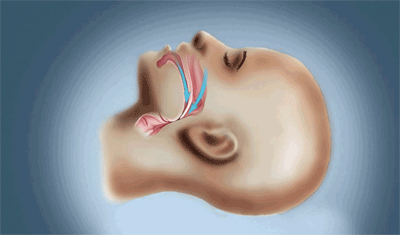Sleep Apnea and Other Sleep Disorders
What is sleep apnea?
Obstructive sleep apnea (OSA) is a serious sleep disorder that causes you to stop breathing during the night. During your sleep the airway is continually blocked, limiting the amount of air that reaches your lungs. Apneas are often followed by loud snoring and choking noises as you attempt to breathe. This also leads to disturbed sleep, with fatigue being a common symptom of sleep apnea.
What causes sleep apnea?

OSA is primarily caused by the tissue in the back of the throat collapsing. The muscles of the upper airway collapse while you sleep. While sleeping on your back, gravity can cause your tongue to fall back which can also obstruct your airway. This leads to a complete collapse or narrowing of your airway during the night, which leads to a decrease in the amount of air reaching your lungs. The narrowed airway leads to snoring due to the vibration of air passing through as you breathe.
Common symptoms of OSA
Often you will wake up feeling tired or unrefreshed even though you have had a full night of sleep. During the day you may feel fatigue, and have difficulty concentrating or you may fall asleep unintentionally. Due to Obstructive sleep apnea disrupting your sleep patterns during the night, your body has been waking up after each apnea even though you are not conscious of each awakening.
Treatment of OSA
The use of continuous positive airway pressure (CPAP) therapy is the front line treatment for OSA. With the use of CPAP the incidence of OSA completely dissipates and leads to normal breathing. Other treatments are the use of an oral appliance or surgery.
The team at Clinique Somnomed aims to combine an efficient sleep clinic, multiple specialty clinic and a personal touch with the care and treatments available today.
Insomnia
Insomnia is a common sleep complaint. It presents as having difficulty falling asleep or maintaining sleep. Short term insomnia last for up to three months, occurring in 15-20 percent of people. Chronic insomnia occurs at least three times a week and lasts for at least 3 months occurring in 10 percent of people. Insomnia is most often associated with another problem, such as stress, sleep apnea, those with chronic medical problems, certain medications, environmental factors, pregnancy, and menopause. A board certified sleep physician diagnoses chronic insomnia. The sleep team at a sleep center can provide ongoing care.
For more information or questions about obstructive sleep apnea treatment, or to schedule an appointment. Call us today at 438-499-8324 or fill out the quick contact form. We will get back to you as soon as possible because helping patients is our #1 priority.
Make an appointment today!
Click here to access form.
Telephone: 438-499-8324
Fax: 450-937-7765
Email: info@somno-med.com
Frequently Asked Questions
Medical requisition is obligatory.
Please note there are fees for sleep testing.
Obstructive sleep apnea is a common disorder in which you have one or more pauses in breathing or shallow breaths while you sleep. Breathing pauses can last from a few seconds to minutes.
Sleep apnea usually is a chronic condition that disrupts your sleep. This affects the quality of your sleep, which leads to feeling tired during the day. Sleep apnea is a leading cause of excessive daytime sleepiness.
Most private health insurance will cover significant portions of the testing. You need to check with your insurance company for the specific coverage as per your policy.
This sleep study is a non-invasive, painless evaluation of your sleep. Electrodes attach with paste and they monitor your brain waves, rapid eye movements, breathing patterns, respiratory efforts, oxygen levels, snoring, muscle tone and leg movements, electrocardiogram and heart rate. You are able to move from side to side. In addition, your body position will be determined via an internal sensor on the device. If you have experienced skin irritation due to EKG testing in the past, please notify the technologist prior to the study. A technologist will be monitoring your sleep during the study.
The device is worn overnight to monitor breathing, oxygen levels, cardiac activity and body movement using several sensors.
Daytime sleepiness and fatigue.
Cognitive impairment and poor job performance.
Anxiety, depression, memory loss and dementia, hypertension, cardiac disease, stroke, and traffic accidents.
